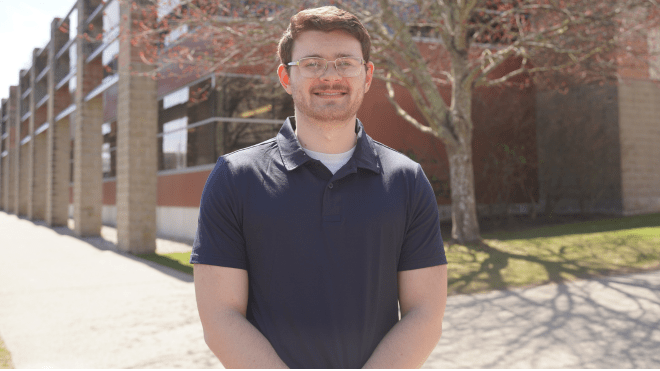Criminal Justice Grad Inspired to Keep Communities Safe as Criminal Investigator
Receiving his bachelor’s in Criminal Justice with the Class of 2024 in May, Sam Trieber is only a few months away from also earning his master’s in the 4+1 Criminal Justice program

A Criminal Justice major and double minor in History and Psychology, Sam Trieber ’24 is drawing on his hands-on experiences at Roger Williams University to propel him on a path to becoming a criminal investigator. Having completed his undergraduate degree this past December, Trieber, who lives in Boston, is on track to attain his M.S. in Criminal Justice by December 2024 through RWU's 4+1 program.
Industry Experience: “I got the opportunity to work part-time at the Tiverton, R.I., police station as a Community Service Officer. We don’t have weapons or do arrests, but we do drive around police vehicles, which is pretty fun. I get to go around and talk to people to make sure they feel safe around the town. It’s been a great experience so far. Once I complete my graduate degree in December, I want to work at a local police department in a criminal investigations capacity – investigating people who have been confirmed guilty and help with finding people to keep communities safer.”
Powerful Combinations: “My two minors, History and Psychology, have allowed me to expand my understanding of Criminal Justice. I think U.S. history lends itself to criminal justice because of its heavy influence on contemporary policies. Psychology and Criminal Justice just connect. I served on a jury a few years ago in a case involving civil commitment, and it made me realize how much psychology and criminal justice intertwine in the real world.”
Discovering His Passion: “Professor Beck Strah had us listen to podcasts for homework assignments. That is when I had the idea to use podcasts to create an empirical design research project that analyzes how inmates are doing in the current prison system. I chose four podcasts that were produced by inmates or someone who interacts with inmates. I analyzed the prison system structure by listening to them using Maslow's hierarchy of needs, and it made me see the realities of the prison systems in the U.S.”
Celebrating our RWU Graduates